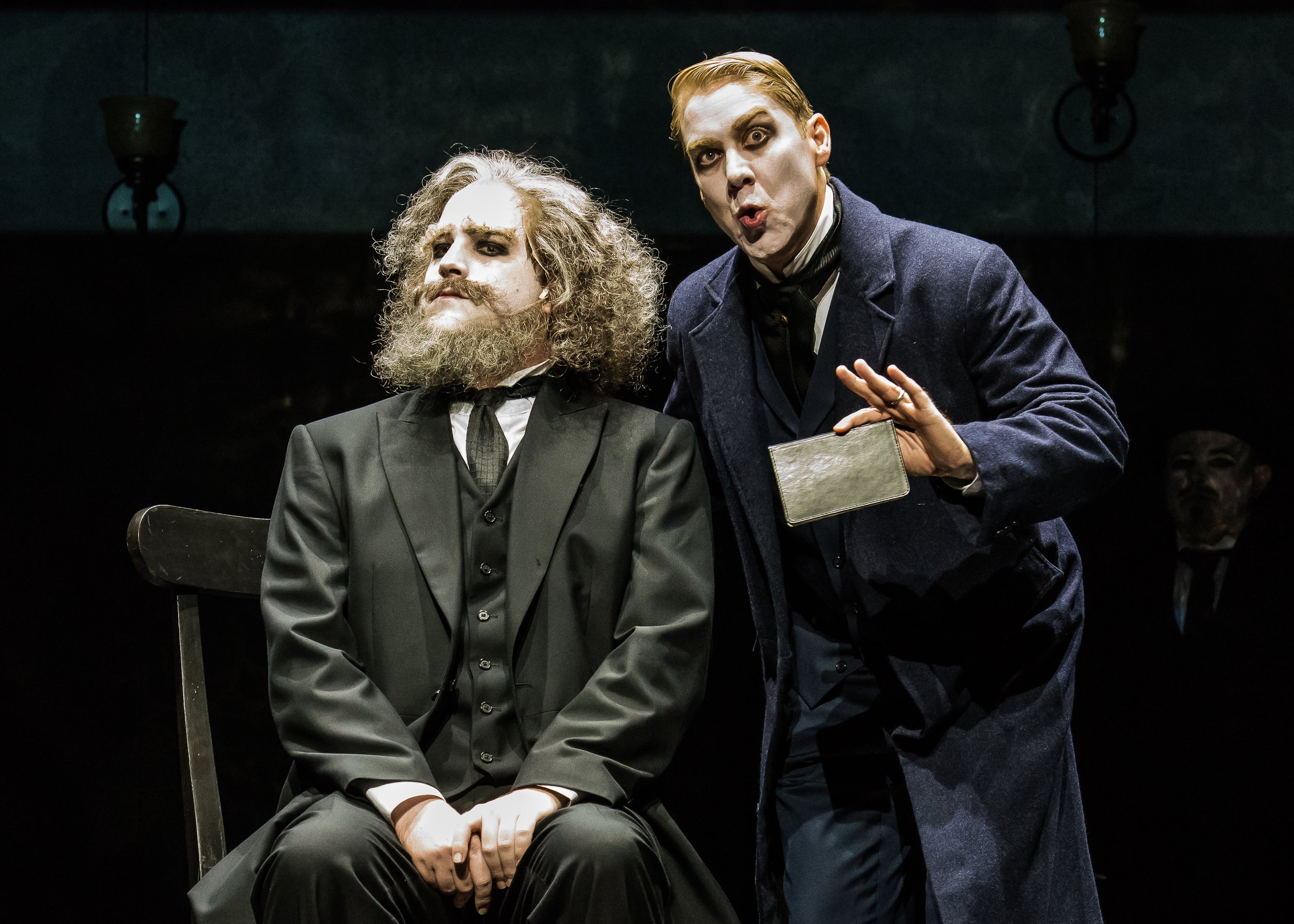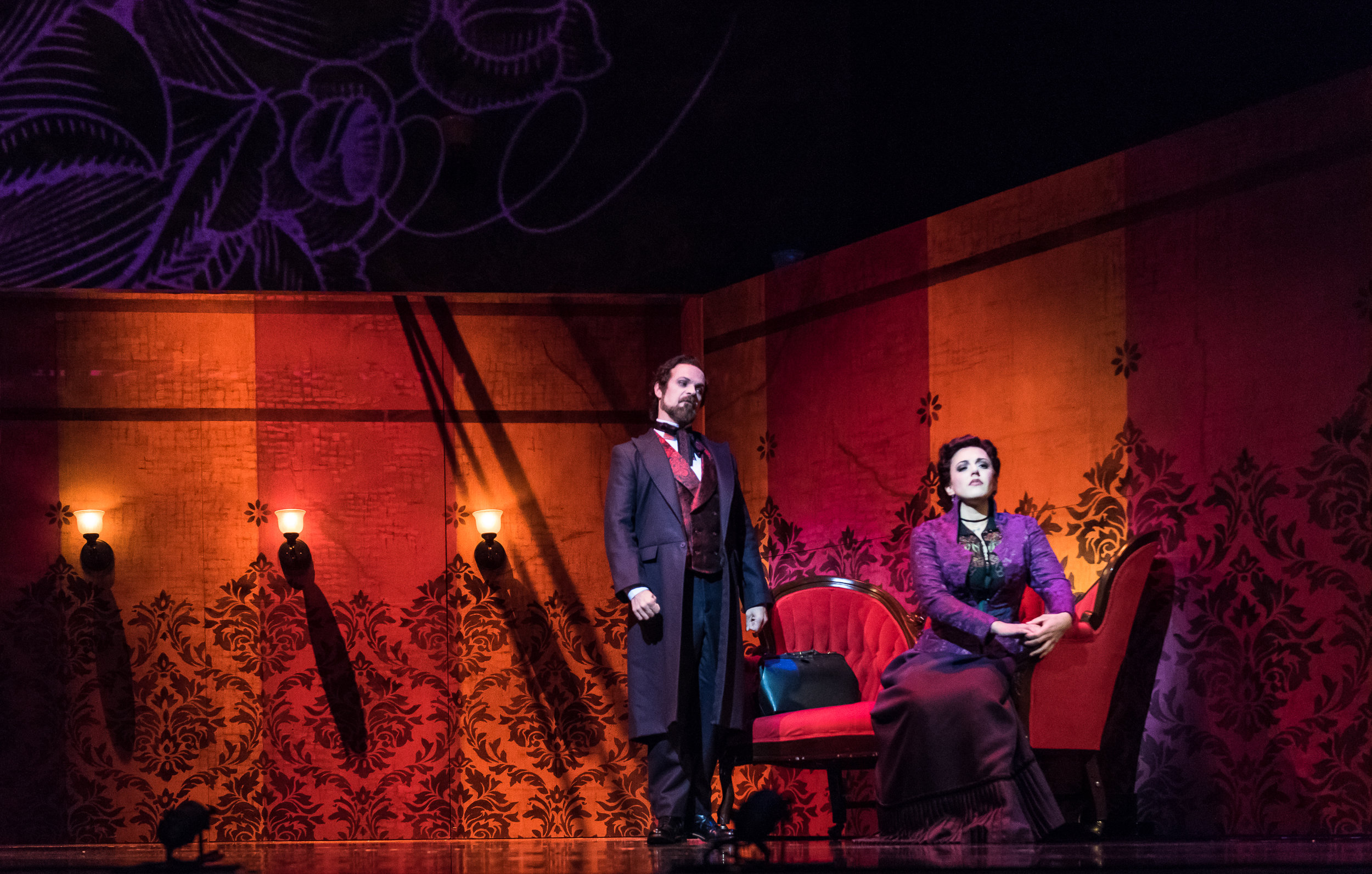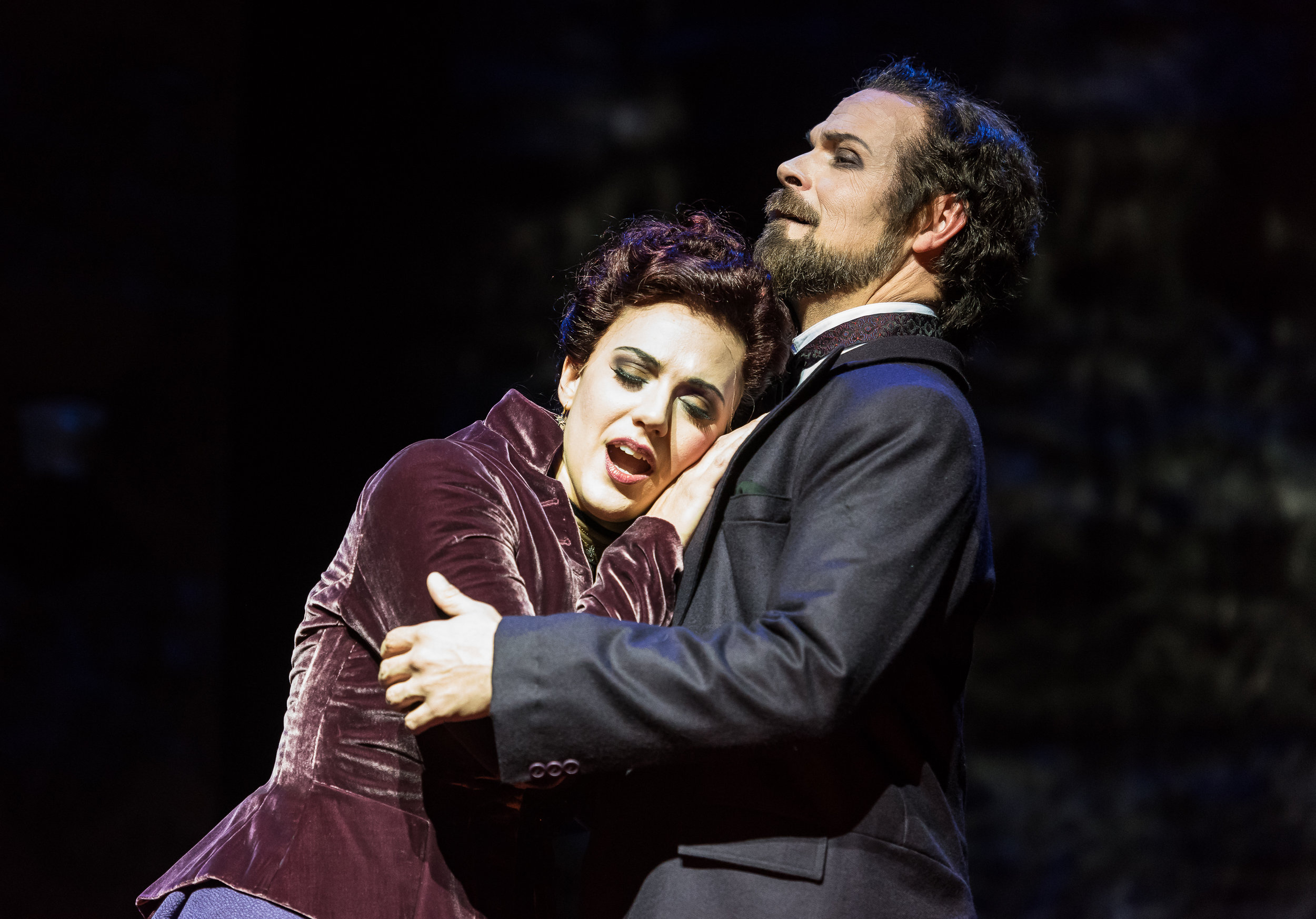I am really annoyed, mad even. Opera Philadelphia’s Elizabeth Cree, by composer Kevin Puts and librettist Mark Campbell, one of the Festival O17 offerings, is in…well, Philadelphia, and I am here in Virginia! I saw it on Saturday, and I can’t go see it again up in Philadelphia, which means that I might never have it figured out for sure. Here’s the good news:
"Lambeth Marsh Lizzie", aka Elizabeth Cree (Daniela Mack) tells how she came to be an orphan. Photo by Steve Pisano; courtesy of Opera Philadelphia.
Alert the movie crowd: the premiere of The Trial of Elizabeth Cree has provided the opera world with its first slasher opera. Oh, I know that murders are the stock and trade of the opera canon, and even Jack the Ripper makes an appearance in Berg’s Lulu, but for sustained servings of Hannibal Lecter excitement, Cree climbs to the top of the dead body pile, but artfully done; after all, this is opera. The thing is…it works. Scenes of horror lurking among good people, and the not so good, have a fascination that grips us, especially when the locale is the dark, smoggy streets of a seedy section of 1880’s London. Overall, the staging of this smallish opera is excellent, especially the scenes of murder shown behind a scrim such that each demise is largely in caricature, but even in outline, entrails elicit a shudder. The gloom enters early. Cree draws us in immediately with the body of a dead woman hanging from the ceiling behind a scrim on the darkened stage, even as the opera begins; we can only see her in shadowy outline, but the image will stay with me a very long time. I assumed at that point that things had not gone well for Ms. Cree in her trial, but all is not as it first seems to be in this opera. Opera Philadelphia wanted Festival O17 to make more contemporary connections – well done; “The Silence of the Lambs”, "Halloween", and The Trial of Elizabeth Cree; It doesn’t get much more modern than that.
John Cree (Troy Cook) describes the murder of the Gerrard family. Photo by Steve Pisano; courtesy of Opera Philadelphia.
It’s not all gloom. True, Ms. Cree (Daniela Mack), once known as Lambeth Marsh Lizzzie, is on trial for poisoning her husband. However, interspersed with the prosecutor’s questioning we view scenes from her life; develop some sympathy for her based on her childhood; and see her achieve some success on the vaudeville stage; she likes the fame. We see her future husband John (Troy Cook) sitting at a desk in the Reading Room of the British Museum, writing about murders; he is a novelist, but is it a notebook or a diary entry I wonder as the scenes of murder play out in the background; are they imagined, or being relived, by Mr. Cree. We meet some famous users of the Reading Room, music hall comedian Dan Reno, novelist George Gissing, and philosopher Karl Marx, all of whom are interviewed by the police inspector, in regard to the murder spree. Finally, Elizabeth and John meet; are married; and secrets are revealed. We will leave the story there, except to say that at the end, I thought I knew what had transpired, but was uncertain enough to be confused. I tried to find the answers in reviews and the internet to no avail. The opera is based on a book of the same name by novelist Peter Ackroyd; I may have to read it.
Left: Dan Leno (Joseph Gaines) introduces Elizabeth as "Little Victor's Daughter". Right: Inspector Kildare (Daniel Belcher) interrogates Karl Marx (Thomas Shivone) about one of the serial murders. Photo by Steve Pisano; courtesy of Opera Philadelphia.
I think that mezzo-soprano Daniela Mack is a force to be reckoned with. Her strong, beautiful voice filled the theater with a convincing portrayal of Elizabeth. She could succeed on the stage as an actress alone; her performance anchored this production. Those of us in the Washington DC area will be treated to another of her performances in November when the Washington National Opera stages Handel’s Alcina; she will return to Philly in April to play Carmen. I have my ticket for Alcina, and after seeing Ms. Mack in person, it is even more precious. Baritone Troy Cook gives a fine performance as John Cree. I thought that tenor Joseph Gaines was a delightful Dan Reno with his singing and dancing, and stage mentoring to Elizabeth. The real-life Dan Reno is so well known in Great Britain that the British edition of Mr. Ackroyd’s book is titled “Dan Reno and the Lighthouse Golem”. The secondary characters were all good and added to the performance. I would like to give kudos to director David Schweizer, but will stay that until I am sure I have it all figured out.
Left: Elizabeth (Daniela Mack) accepts John Cree's (Troy Cook) proposal of marraige. Right: The marraige has developed problems. Photo by Steve Pisano; courtesy of Opera Philadelphia.
Oh yes, and there is also music, quite good music, performed by a small group of 16 musicians, and conducted by Corrado Rovaris. My focus was mainly on the drama and the singing, but when the music gained my attention, I liked what I heard; the score was musically varied in style and instruments, pleasing and supporting the action on stage. There are some catchy dance hall songs performed, more reminiscent of musicals than opera – I do not object. I thought the music served the opera well, but can’t offer more without hearing it again, and as previously stated, I can’t do that!
How does this new opera stack up in the opera world? Too early to tell. It is a ninety-minute chamber opera that packs a musical and dramatic punch. I suspect it will get some play. Knowing what I know now, if I had not seen it yet, I’d tell myself to go. Having seen it, I’d like to see it again – but I can’t! It’s not going to substitute for La Traviata, but for a Saturday afternoon or evening’s engaging, artful entertainment, it is clearly worth the investment. And as a new opera, it has its own, special excitement.
The Fan Experience: See my blog report on The Magic Flute for this section with comments about my trip to Philly to take in some of O17. I will add that I really liked the 90 minute, non stop format for a matinee. Also, the Perelman theater seems to have no bad seats and was perfectly designed for a smaller production. For remaining performances see the OperaGene blog sidebar at the right (or bottom for viewing on mobile phones). I implore you: please go see it, and then explain it to me. In the last three seasons, I have seen Cold Mountain, Breaking the Waves, and The Trial of Elizabeth Cree, all new operas and all in Philadelphia. Many thanks and kudos to Opera Philadelphia for breathing fresh life into this wonderful art form!






